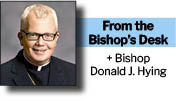
Canon law requires that every transitional deacon go on a retreat prior to being ordained a priest, as an intense spiritual preparation before taking such a serious step in his life.
Every January, I am blessed to lead this retreat for the fourth-year deacons from St. Francis de Sales Seminary in Milwaukee.
This group always includes some of our own men from Madison.
As you read this column, we are on retreat at Joseph and Mary Retreat House in Mundelein, Ill., and I ask for your prayers for these men.
The quality and character of the young men preparing for the priesthood these days give both hope and inspiration for the future of the Church.
They have each swum upstream against a secular culture to hear the call of the Lord and to respond. They have engaged in the challenges of seminary formation for many years, learning how to pray, studying theology, working on their human formation, and engaging in varied and challenging pastoral settings.
These long years of preparation for the priesthood stretch a man to grow in self-knowledge, Christian virtue, theological acumen, and pastoral ability. It is not an easy process nor should it be.
The need for priests
The Church needs priests who love the Lord and His Mystical Body, preach the Gospel with both charity and truth, celebrate the sacraments with reverence and attention, serve people with the Heart of Christ, and are willing to hand their entire life over to this mysterious and sacrificial participation in the priesthood of Jesus Christ, who came to save the world.
A priest needs to be a spiritual father, an effective confessor; a fruitful preacher; a loving pastor; an adept administrator; a courageous leader; a community organizer; a creative problem-solver; a man of encouragement, hope, and joy; and a tireless communicator of the Good News to a world which is often indifferent and even hostile to the person and message of Jesus Christ.
He must do this in a pastoral context with people of very different personalities, beliefs, and understandings of Catholicism, all the while seeking to be an alter Christus, another Christ.
Those whom the Lord calls to the priesthood may not always be the smartest, holiest, or ablest candidates, but God chooses whom He does to do His work on earth.
In many ways, I do not feel qualified to be a bishop, yet I trust that the Lord would not entrust such a task to me without also offering the requisite grace to accomplish His will.
Oftentimes, He qualifies the called, rather than calling the qualified.
Such a realization leads those in Holy Orders to a great humility — boundless confidence in God combined with an embrace of their own human weakness.
Often, when I am preaching, I feel that I am the one who needs to hear this saving Word more than anybody. In the confessional, I need the Lord’s mercy as much as the penitent confessing sins.
The priest washes his hands at the Preparation of the Gifts during Mass as a reminder of his own sinfulness and need for salvation.
An effective and holy priest can fuse the graces given to him by virtue of ordination with his own human struggle to believe, love, and forgive.
In this way, he can understand the weaknesses and sins of his people because he is deeply aware of his own.
The priest, in imitation of Jesus, the High Priest of the New Covenant, brings the Lord to his people and brings his people to the Lord.
Through preaching the Word, celebrating the sacraments, and shepherding the People of God, the priest becomes a vessel of God’s grace, action, and salvation.
His life is a sacrificial self-emptying in service of Christ and the Kingdom of God.
Pray for our priests and seminarians. They are good, holy men, seeking to serve, love, and help all of us to go to Heaven. I love them and am very grateful for each of them!
What is a priest?
Here is a quote from Karl Rahner:
“The priest is not an angel sent from Heaven. He is a man, a member of the Church, a Christian. Remaining man and Christian, he begins to speak to you the Word of God. This Word is not his own. No, he comes to you because God has told him to proclaim His Word. Perhaps he has not entirely understood it himself. Perhaps he adulterates it. Perhaps he falters and stammers. How else could he speak God’s Word, ordinary man that he is? But must not some one of us say something about God, about eternal life, about the mystery of grace in our sanctified being; must not some one of us speak of sin, the judgment and the mercy of God?”

